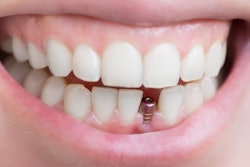
Antihypertensive medications may do more than lower blood pressure. Taking them may reduce a patient's chances of early dental implant failure, reports the findings of a large study that was recently published in the International Dental Journal.
The rate of early implant failure was lower in patients with hypertension who took blood pressure-lowering drugs than in patients with and without the medical condition who didn't take the medication, the authors wrote.
"Clinicians should be encouraged to treat hypertensive patients with implant-supported prostheses, provided patient compliance regarding medications intake is good," wrote the authors, led by Dr. Gavriel Chaushu of Rabin Medical Center in Israel (Int Dent J, July 18, 2024).
By 2025, more than 1.5 billion people globally are expected to have high blood pressure. The condition is more common in older adults, and about half take medication to manage their blood pressure.
Blood pressure-lowering medications boost osteoblast differentiation and bone formation. New bone formation and remodeling are necessary for osseointegration of dental implants. Therefore, patients who take antihypertensive medication may experience better osseointegration.
To evaluate the effect of blood pressure-management medications on osseointegration of dental implants, a retrospective cohort study that included 792 patients was conducted. Of the patients, 14 had hypertension but were not taking medication, 185 had high blood pressure but were managing it with antihypertensive drugs, and 593 had normal blood pressure, according to the study.
Each patient had received at least one dental implant with or without bone augmentation. Additionally, implants that lacked new bone formation or excessive bone turnover during osseointegration at 12 months or less after loading were considered early implant failure, the authors wrote.
The early implant failure rate was nearly 10% in patients with hypertension who were taking medication to manage their blood pressure, which was considerably lower than the nearly 15% rate in patients who didn’t have high blood pressure. Though the sample of patients with hypertension not taking medication was small, they were the most likely (p = 0.041) to experience early failure with a rate of about 29%, the authors wrote.
In total, 2,971 implants were placed in the patients. In the patients not diagnosed with hypertension, 2,123 implants were placed. Furthermore, 784 implants were placed in patients with hypertension taking medication and 64 were implanted in patients with high blood pressure not taking medication.
Conjointly, early implant failure was reported for nearly 4% of implants. In patients with hypertension not taking medication, early failure was about 6%, which was significantly higher (p < 0.001) than the two other groups. The rate of early failure in the hypertension group taking medication was about 2%, which was dramatically less than the approximately 4% of patients who didn't have high blood pressure, they wrote.
Controlling modifying factors, including age, gender, number of implants placed, and using antihypertensive medication resulted in lower early implant failure with marginal significance (p = 0.059, odds ratio = 0.618), the authors wrote.
Limitations of the study include its retrospective nature.
"Within its limitations, the present study suggests that using antihypertensive medications may decrease the EIF (early implant failure) of dental implants," Chaushu and colleagues wrote.



















